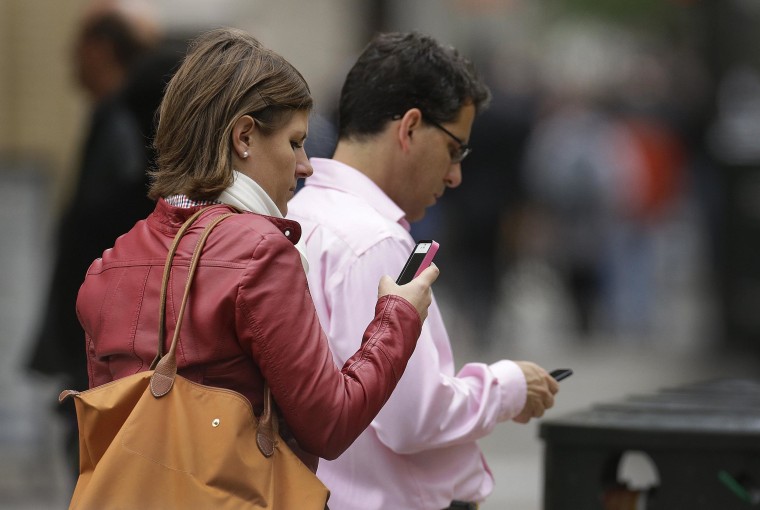Smartphone thefts rarely make national news anymore—unless the victim was seriously hurt or killed during the robbery.
But the crime spree has not gone away. It seems to have gotten worse.
About 3.1 million Americans had their phones stolen last year, according to a just-released national survey by Consumer Reports. That's nearly double the magazine's estimate of 1.6 million mobile phones stolen during 2012.
"You have to take into account the fact that there are more smartphone owners now, but 3.1 million is still a pretty big number," said Donna Tapellini, a senior editor at the magazine.
Why do so many thieves snatch smartphones? Because it's lucrative—they can quickly turn that phone into cash.
If your phone is stolen, your carrier can disable it and add it to a national database, so that it won't be activated again. But this blacklist does not always work in other countries, where stolen phones can be sold and brought back to life.
That's why New York Attorney General Eric Schneiderman and San Francisco District Attorney George Gascon formed the Secure Our Smartphones (S.O.S.) initiative to push for "kill switch" technology in all new smartphones.
Throw that kill switch and the phone would never work again—anywhere in the world. That, they say, would remove the economic incentive for this crime.
A new survey of 1,200 smartphone users by William Duckworth, a business professor at Creighton University, shows overwhelming support for this anti-theft technology.
"Not only do people want a free kill switch on all phones, they expect it," Duckworth said. "Most people, 83 percent, really think this will bring down crime and 99 percent believe the wireless carriers should make that a blanket option for everyone," Duckworth said.
"Not only do people want a free kill switch on all phones, they expect it."
Some cellphone makers got behind the idea of a kill switch last year, but American wireless carriers have consistently opposed it—until very recently.
Critics claim that opposition was based on economics, since the carriers make a lot of money from the sale of phone insurance.
Economic impact
As part of his research, Duckworth looked at the economic impact of kill switch technology. He estimates that it could save American consumers up to $2.6 billion a year. Here's how he figured that:
- We spend $580 million to replace stolen phones each year.
- We pay another $4.8 billion for premium cell phone insurance—that covers theft—from the wireless carriers.
Duckworth's research indicates that at least half of all smartphone owners would reduce their insurance coverage if kill switch technology was widely adopted and lowered the crime rate. They would switch from premium insurance sold by the wireless carriers to more basic coverage offered by third-parties, such as Apple and Square Trade, which according to Duckworth's estimate would save another $2 billion a year.
Cellphone companies offer their solution
On Tuesday, CTIA—the Wireless Association, announced that the five major U.S. carriers (AT&T, Sprint, T-Mobile, U.S. Cellular and Verizon), along with major equipment manufacturers (including Apple, Google, HTC America, Motorola, Microsoft and Samsung) had signed onto the Smartphone Anti-Theft Voluntary Commitment.
They agreed that all new smartphones manufactured after July 2015 for sale in the U.S. would offer, at no cost to the consumer, an anti-theft tool that is preloaded or could be downloaded.
This software would allow the owner to remotely erase all data on the phone, prevent its use without a password or PIN, and prevent reactivation without the authorized user's permission.
This is similar to Apple's Activation Lock, built into iOS 7. This security feature gives owners the ability to remotely erase all the data on the phone and lock it so that it cannot be reactivated without the Apple ID and password. There is also similar software available for Android phones.
Gascon and Schneiderman called CTIA's decision "a welcome step forward," and an "important acknowledgement by the smartphone industry that technology to deter theft is not only feasible, but also practical."
But in a joint statement they said this voluntary program "falls short of what is needed to effectively end the epidemic of smartphone theft." They want the anti-theft features enabled by default on all new smartphones, rather than relying on customers to opt-in.
State Sen. Mark Leno, D-San Francisco, is the prime sponsor of a bill in the California legislature (SB 962) that would require all smartphones sold in that state to come equipped with pre-enabled theft-deterring technology. He also found CTIA's announcement less than adequate.
"For stolen phones to have no resale value on the black market, the vast majority of consumers must have the theft-deterrent feature pre-enabled on their phones," Leno said in a statement. "Inexplicably, the mobile industry refuses to take this approach, which will simply prolong the epidemic of thefts we're seeing in California and the rest of the country."
Consumer Reports just published a list of five things you can do to protect your smart phone from theft or loss.
